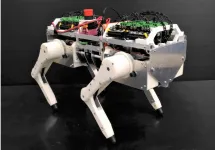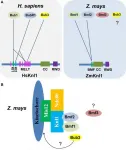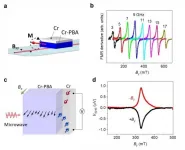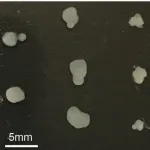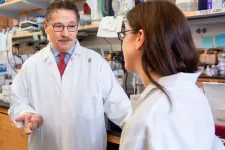Women described feelings of isolation, exhaustion, worry, inadequacy, guilt, and increased stress. Many grieved for what they felt were lost opportunities for them and their baby, and worried about the developmental impact of social isolation on their new little one.
Those whose partners were unable or unavailable to help with parenting and domestic tasks, particularly where they were also dealing with the demands of home schooling, felt the negative impacts of lockdown most acutely.
Researchers surveyed 162 mums in London between May and June 2020 using a unique social network survey designed in response to lockdown. Participants listed up to 25 people who were important to them and shared who they had interacted with and how, whether in person, by phone, video call or messaging on social media.
The women also reported on their well-being with researchers basing depression ratings on the Edinburgh Postnatal Depression Scale, the most commonly used tool. This allowed them to capture the full range of mothers' social interactions, as well as their mental health.
The findings are published today (11 May 2021) in the journal Frontiers in Psychology.
The more contact new mums had with people, either remotely or face-to-face, the fewer depressive symptoms they reported, suggesting reduced social contact during lockdown may have increased the risk of postnatal depression.
However, where women had maintained some face-to-face contact with family members, they were actually more likely to have depressive symptoms than women who saw fewer of their relatives. Researchers think this reflects family responding to mums who were struggling with their mental health, potentially breaking lockdown rules to help them.
Many mothers felt that lockdown created a 'burden of constant mothering' without anyone around to help, and that while virtual contact (video calls/phone calls/texts/social media messages) helped, it was still inadequate. Virtual contact meant women had to actively ask for help, because friends and family couldn't see them struggling, which they felt amplified the stresses of motherhood.
Dr Sarah Myers (UCL Anthropology) said: "Caring for a new baby is challenging and all new mothers suffer some level of mental, physical and emotional exhaustion. Low social support is one of the key risk factors for developing postnatal depression. Social distancing measures during lockdown created so many barriers to having practical help and meaningful support from others in the weeks and months after their baby's arrival, leading many new mothers to feel totally overwhelmed.
"It really does take a village to raise a child, especially in a crisis when everyone is dealing with increased demands, stresses and significant life events. Our survey shows that lockdowns leave new mothers more vulnerable to postnatal depression, and that digital solutions might help but they are not the answer. Policy makers must take this into account as we continue to deal with COVID-19, for the sake of mums, babies and whole families."
Not everything new mums experienced as a result of lockdown was negative. Some felt it 'protected' family time, leading to better bonding. Other benefits included partners being around more to co-parent and help out than if the UK had not been in lockdown.
Dr Emily Emmott (UCL Anthropology) said: "New mothers with more than one child were hardest hit, left to deal with newborns on top of multiple demands like home schooling. First-time mothers often felt cheated out of precious time spent together with their babies and family or friends, making coming to terms with the change of identity and isolation that new mothers often feel even harder.
"But, where partners were at home more because of lockdown, and able to share the relentless tasks and household chores or take care of existing children, new mums felt the benefits. Some reported that it helped everyone develop closer relationships and that the family benefited overall from spending this time together. This should also be food for thought when we look at support for parents with new babies, not just in a pandemic."
Comments from new mothers surveyed about their experiences included: "It has definitely made me more anxious - am I doing enough for my baby, is she ok, is she healthy and happy, should I be doing more, do people think I'm a good mother? Much of this is because it's hard to communicate online."
A first-time mother said, "I feel I'm making it up as I go along and have no one to guide me", while another mum said, "I worry that my child isn't getting the development they deserve as they are not getting enough stimulus."
One mum described how, "We haven't had anyone come over to give us a break since before lockdown and it's exhausting." Another said: "I think lockdown has made me feel like I'm not a person in my own right anymore. Not having anyone to hold him or to help out a bit makes me feel it's all me and it's a lot of pressure, which I can resent. I feel like I don't have any time to rest." While another mum said, "I am an exhausted mum not able to concentrate on either of my children and this is taking a toll on everyone."
INFORMATION:
Notes to Editors
For more information, or to speak to the researchers involved, please contact: Jane Bolger, UCL Media Relations. T: +44 (0)20 3108 9040 /+44 (0)7713 261 477 E: j.bolger@ucl.ac.uk
Sarah Myers, Emily H. Emmott: Communication Across Maternal Social Networks During England's First National Lockdown and Its Association With Postnatal Depressive Symptoms will be published in Frontiers in Psychology on Tuesday 11 May 2021 at 0500 UK time, 0600 CET, 00:00 Eastern Time and is under a strict embargo until this time.
The DOI for this paper will be: 10.3389/fpsyg.2021.648002.
Dr Sarah Myers is also a member of the Birthrites Independent Max Planck Research Group on the Cultures of Reproduction.
About UCL - London's Global University
UCL is a diverse community with the freedom to challenge and think differently.
Our community of more than 41,500 students from 150 countries and over 12,500 staff pursues academic excellence, breaks boundaries and makes a positive impact on real world problems.
We are consistently ranked among the top 10 universities in the world and are one of only a handful of institutions rated as having the strongest academic reputation and the broadest research impact.
We have a progressive and integrated approach to our teaching and research - championing innovation, creativity and cross-disciplinary working. We teach our students how to think, not what to think, and see them as partners, collaborators and contributors.
For almost 200 years, we are proud to have opened higher education to students from a wide range of backgrounds and to change the way we create and share knowledge.
We were the first in England to welcome women to university education and that courageous attitude and disruptive spirit is still alive today. We are UCL.
http://www.ucl.ac.uk| Follow @uclnews on Twitter | Watch our YouTube channel | Listen to UCL podcasts on SoundCloud | Find out what's on at UCL Minds | #MadeAtUCL
Find out how UCL is helping lead the global fight against COVID-19 http://www.ucl.ac.uk/covid-19-research
